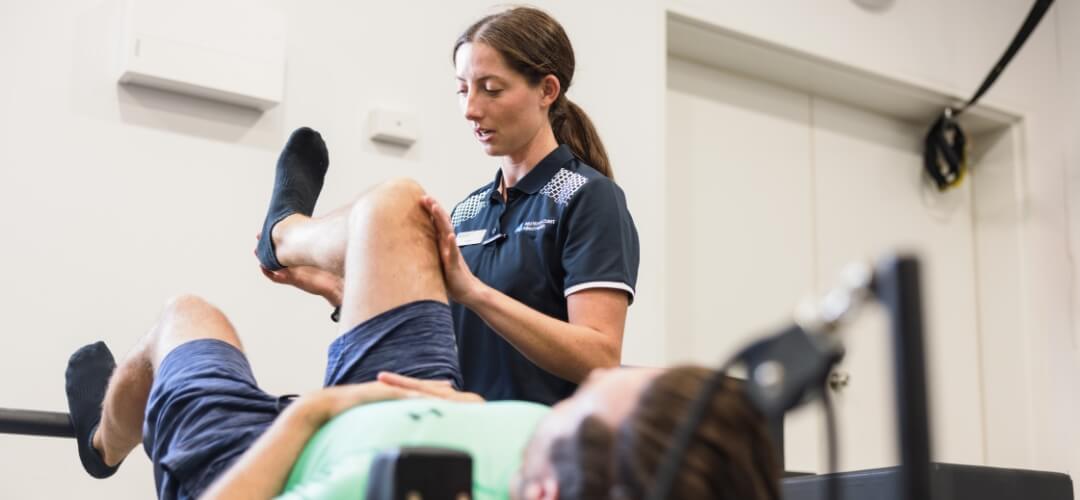Physiotherapy, often simply referred to as physio, is a branch of healthcare that plays a pivotal role in restoring and maintaining movement and physical function. It’s a profession that goes beyond the conventional understanding of healthcare, focusing on empowering individuals through personalised care and education.
In this blog, we’ll delve into the world of physiotherapy, exploring what it is, how it can help, and common questions that often arise, such as whether it’s covered by Medicare or the NDIS.
Whether you’re suffering from an injury, you’re seeking pain relief, or you simply want to improve your physical health and well being, physiotherapy can unlock a world of possibilities and benefits. Let’s take a closer look at this popular form of physical treatment.
What is Physiotherapy?
Physiotherapy is a holistic healthcare discipline that revolves around enhancing the quality of life by optimising physical function. Highly trained physiotherapists employ a comprehensive range of evidence-based techniques and exercises to diagnose, treat, and prevent a wide spectrum of physical conditions.
Whether you’re on the path to recovery from a sports injury, coping with the challenges of chronic pain, or simply striving to enhance your overall physical health and fitness, physiotherapy stands as a beacon of hope and healing.
At Mid North Coast Allied Health, we embrace a patient-centred approach to our physiotherapy services that not only addresses the immediate concerns but also delves into the root causes of physical discomfort, ensuring that you not only feel better today but also experience lasting improvements in your mobility, strength, and vitality tomorrow.
Is Seeing a Physio Worth It?
The short answer? Absolutely! We may be biased, but here at MNC Allied Health, we believe that physiotherapy is not just about managing pain and promoting healing; it’s about preventing injuries and enhancing strength and flexibility.
Physio is worth your while if you need rehabilitation after surgery or injury, as it can drastically improve your ability to get back on your feet faster.
Physio has also been found to help reduce or improve symptoms caused by chronic pain and a myriad of other conditions, allowing you to live a fuller, more active life.
The real value of physiotherapy lies in its ability to address not only the symptoms but also the root causes of physical issues. It’s the equivalent of treating the wound properly rather than simply putting a band-aid on the cut.
Is Physiotherapy Covered by Medicare?
In Australia, physiotherapy services are generally not covered by Medicare for most individuals in the community. However, there may be specific situations where Medicare rebates are available, such as through the Enhanced Primary Care (EPC) program, which requires a referral from a GP for chronic conditions.
If you’re part of a private health fund, however, you should be able to claim most of our services under extras cover – you only need to pay the gap. Be sure to bring your health fund card to your appointment, and we can process the health cover funds on the spot using the HICAPS system.
Not sure whether your health fund covers our services? Take a look at your private health provider’s website and offerings to find out, or get in touch with our team to see how we can help you find the correct information.
What Conditions Can Physiotherapy Treat?
Physiotherapy is an exceptionally versatile field that boasts a wide-ranging scope, making it a valuable resource for individuals grappling with various physical conditions. This specialised form of care is not limited to one-size-fits-all solutions; instead, it thrives on crafting personalised treatment plans tailored to your unique needs.
Some of the common conditions effectively treated by physiotherapy include:
- Musculoskeletal Pain: Whether you’re struggling with back pain, joint discomfort, or muscle strains, physiotherapists employ a combination of manual therapies, exercises, and modalities to alleviate pain, improve range of motion, and enhance function.
- Sports Injuries: Athletes of all levels rely on physiotherapy for injury prevention, recovery, and performance enhancement. From sprained ankles to torn ligaments, physiotherapists devise sports-specific rehabilitation programs to get you back in the game safely and swiftly.
- Neurological Disorders: Individuals dealing with neurological conditions such as stroke, Parkinson’s disease, or multiple sclerosis benefit from physiotherapy interventions designed to improve balance, coordination, and mobility, enhancing overall quality of life.
- Post-operative Rehabilitation: Surgery often requires a dedicated rehabilitation plan to regain strength and function. Physiotherapists guide post-operative patients through tailored exercises and hands-on therapies to expedite recovery.
- Orthopaedic Conditions: Conditions like osteoarthritis, rheumatoid arthritis, or degenerative joint diseases can significantly impact daily life. Physiotherapy offers non-invasive approaches to manage pain, maintain joint health, and improve joint function.
- Paediatric Conditions: Children facing developmental delays or neuromuscular disorders can benefit from paediatric physiotherapy to achieve developmental milestones and improve overall motor skills.
- Geriatric Care: Older adults often turn to physiotherapy to maintain independence and address age-related issues like balance problems, osteoporosis, and frailty, thereby enjoying an improved quality of life.
- Women’s Health: Physiotherapy plays a vital role in addressing women’s health concerns such as pelvic floor dysfunction, pregnancy-related discomfort, and postpartum recovery, ensuring overall well-being at every stage of life.
These are just a few examples of the conditions that physiotherapy can effectively treat, or help to reduce the symptoms of. It’s a versatile and patient-centred approach that aims not only to relieve symptoms but also to enhance your overall physical health and function, allowing you to lead a more active and fulfilling life.
Does the NDIS Cover Physiotherapy?
At Mid North Coast Allied Health, we understand the unique needs of individuals living with disabilities. We’re committed to providing specialised NDIS and disability-focused physiotherapy to help people achieve their goals and enhance their quality of life.
We have a team of dedicated therapists who are experienced and passionate about assisting individuals of all ages, from babies to adults, with a wide range of disabilities.
Our NDIS specialists are well-versed in the National Disability Insurance Scheme (NDIS) and can work with clients who are self-managed, plan-managed, or agency-managed under the NDIS.
We understand the importance of collaboration in the journey to better health and well-being, and we work closely with other local providers, including occupational therapists, speech therapists, psychologists, doctors, specialists, therapy assistants, and dieticians to ensure holistic and comprehensive care.
We invite you to contact our friendly team to discuss your or your loved one’s NDIS plan inclusions and how we can assist with starting NDIS-covered physiotherapy treatment today.
Physiotherapist vs Doctor: What’s the Difference?
Physiotherapists are not medical doctors but hold advanced degrees in physiotherapy. They are highly trained healthcare professionals with expertise in diagnosing and treating physical conditions, often working closely with medical doctors to provide comprehensive care.
At Mid North Coast Allied Health, our experienced team of allied health care practitioners have extensive training and qualifications in physiotherapy and exercise physiology. You can trust in our dedicated team to collaborate with other skilled therapists and deliver the best care possible to treat your condition.
How to Find the Right Physiotherapist
Finding the right physiotherapist involves considering your specific needs and goals. Look for a qualified and experienced practitioner who specialises in your condition, has a good track record, and communicates well with you.
A personal connection and effective communication are essential for a successful physiotherapy journey, but we understand this isn’t always easy to find straight away. If you’re feeling unsure, it never hurts to call or get in touch with a clinic and speak to their practitioners before booking your appointment.
How Many Times Should I Go to Physio?
The frequency of physiotherapy sessions depends on your condition and treatment plan. Your physiotherapist will assess your progress and recommend the appropriate number of sessions to achieve your goals effectively.
How Long Should Physio Last?
The duration of physiotherapy varies widely, from a few weeks to several months, depending on the complexity of your condition and your individual response to treatment. Consistency and commitment to your prescribed exercises and treatments are key to success.
When looking at your physiotherapy treatment from a wider lens, it’s good to remember that it’s not just about short-term relief. Proper physio focuses on long-term well-being, helping you maintain a healthy, active lifestyle and prevent future injuries for many years to come.
Physiotherapy Success Rates
Physiotherapy has a high success rate when it comes to improving physical function, managing pain, and achieving long-term wellness. However, success depends on various factors, including your adherence to treatment plans and the nature of your condition.
When answering the question ‘does physiotherapy work?’ it’s important to consider these points above. Every individual is different, just as every person’s treatment and rate of progress will vary.
Start Your Physiotherapy Journey Today
Physiotherapy is a dynamic healthcare discipline that can significantly improve your physical well-being, from pain management to long-term fitness goals. While it may not always be covered by Medicare, the benefits far outweigh the costs.
If you’re seeking expert physiotherapy services, look no further than Mid North Coast Allied Health. Our dedicated team is here to provide personalised care and guide you on your path to better health.
Discover our easily accessible clinic locations to find your closest centre. Don’t hesitate to book an appointment with us today and take the first step toward a healthier, more active life!
The Top 5 Benefits of Joining an Exercise Class
In today's busy world, finding time to stay fit and active can be a challenge — especially when work demands, family commitments, and various other responsibilities seem to vie for our attention. However, one excellent way to prioritise your health and fitness goals...
What are Cervicogenic Headaches?
A cervicogenic headache is a pain that develops in the neck, though a person feels the pain in their head. Cervicogenic headaches are secondary headaches. Secondary headaches are those caused by an underlying condition, such as neck injuries, infections, or severe...
Exercise for Rotator Cuff Tendinopath
The rotator cuff is a collection of four muscles that connect the arm bone to the shoulder blade. They work together to provide stability to the shoulder, especially in an overhead position. However, highly repetitive tasks involving the shoulder (such as...







